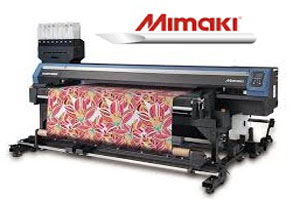
Mimaki improves productivity and flexible of their textile printers
YarnsandFibers News Bureau 2017-03-17 16:00:00 – UkMimaki, a global industry leader and manufacturer of wide-format inkjet printers, cutting plotters, 3D modeling machines and RIP software has updated its Tx300P-1800 and Tx300P-1800B direct-to-textile printers to simultaneously load both textile pigment and sublimation dye inks. This new technology aims to improve productivity and increase flexibility for their textile printers.
The manufacturer stated that this will enable the use of a single printer to print directly on a wide range of textiles without the need to change out ink systems.
Ronald van den Broek, General Manager Sales of Mimaki Europe said that in the textile and apparel markets, quick deliveries and short, customized production are becoming increasingly important. This new system is specifically designed to address this need for cost-effective short run printing of textiles for products or samples.
It means that producers can switch fabric types quickly and easily, selecting the appropriate ink system for each fabric. And these inks do not require usage of water or steaming in the post-treatment process, making them environmentally sustainable as well.
Mimaki offers five different ink types for textile printing, including sublimation dye ink, dispersion dye ink, textile pigment ink, reactive dye ink and acid dye ink. In the normal course of operation, one ink per printer must be selected. But now textile producers will be able to use the two most popular ink types in one single printer.
The Tx300P-1800 and Tx300P-1800B direct-to-textile printers will be able to simultaneously load TP400 textile pigment ink for cotton and hemp materials as well as Sb420 sublimation dye ink for polyester material. Since neither ink type generally requires steaming or washing in the post-treatment process, there is no need for a large space, a huge quantity of water, or special expertise in handling the printed fabric, the company reports. All that is required is the printer and colour fixing equipment, making these entry-level printers suitable for use by designers, fabric workshops, and educational and research institutions.
Mimaki understanding the need for an affordable printer with a compact footprint for their users have moved swiftly to address this need with a very unique approach. As digital textile printing continues to gain traction, they are very excited about this breakthrough.
Market Intelligence
Ask for free sample Report

experience
Customer Base
dedicated team
Countries Served Worldwide









